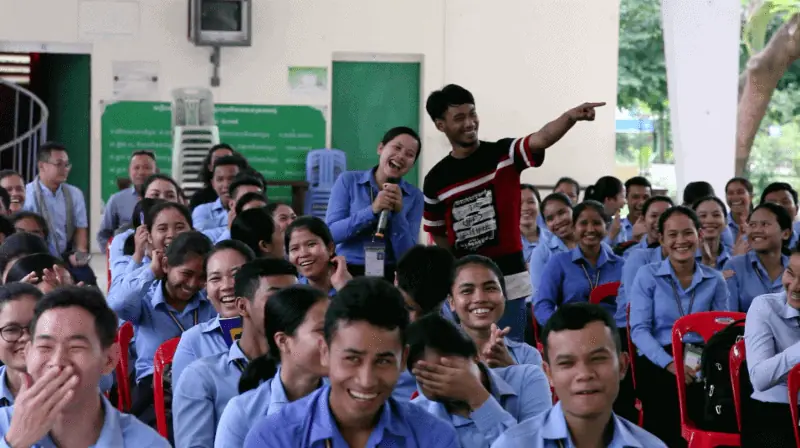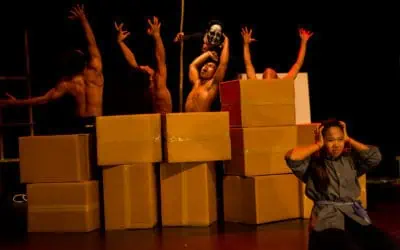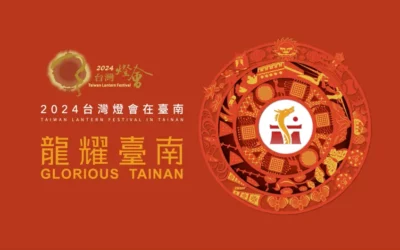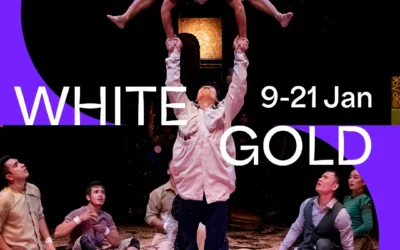“SEE YOU YESTERDAY” MEETS THE FUTURE
Cambodian cast leads workshops for 800 student teachers
(Guest post from Global Arts Corps)
“See You Yesterday” cast members from Phare Ponleu Selpak and Phare, The Cambodian Circus lead a workshop with students at the Regional Teacher Training Center in Siem Reap, April 2018.
This past March and April, Global Arts Corps re-joined the Phare artists of “See You Yesterday” to tour three major cultural hubs in Cambodia and conduct workshops at the regional teacher training centers, the colleges where all of the country’s future educators receive their training.
For decades, the genocide perpetrated by the Khmer Rouge was excluded from Cambodia’s national schoolbooks. Survivors of the regime were often too traumatized or ashamed to speak about their experiences openly, and younger generations didn’t feel safe enough to ask their burning questions about what had happened.
“See You Yesterday” was created to break a silence.
During 19 weeks of development and rehearsal spread out over a 5-year period, Phare artists created a theatre production using their spectacular circus skills to explore their parents’ and grandparents’ memories of a genocide they had never lived. In the process, they discovered powerful and simple ways of creating understanding and empathy between themselves and their elders. After touring “See You Yesterday” to the Kigali Genocide Memorial Center for a festival and then performing for 18,000 people in the Kigeme Congolese refugee camp, this group now felt ready to share their insights with their country’s future teachers back at home.
Phare artists performed for diverse audiences in outdoor, free, public performances in Phnom Penh, Siem Reap, and Battambang to over 4,000 people. In these audiences were a total of over 800 young Cambodian teachers in training.
On the days following each of these performances, Phare artists shared with these teachers what it felt like to live in the shoes of their elders; to imagine their lives out of the broken, inherited fragments of stories and rumors that floated through the silence. They talked about what it felt to start asking questions for the first time. They shared their feelings about how it was frightening at first… and how they needed to learn to trust their own feelings and not run away from uncomfortable truths. They demonstrated some of the empathy and trust exercises they found they needed to perform as a community of actors. They talked about learning how to let their own personal humor and courage and compassion enter into the pain of the stories they were revealing. They told how hard it was to rehearse things they didn’t believe in, only to realize that once they rehearsed something, they could understand it.
“A big point for me, and something that makes this project so special is that the play they saw last night came from all of us, from our real stories. When Michael and his team came to work with us, they came with empty hands, no scripts. During our rehearsals, every one of us had a chance to tell our own stories, and that’s how we created this play. It came from all of us.”
— Sambath, See You Yesterday cast member (2018)
“For me, it’s not just a performance or an episode for us to share; it’s a chance for all of us to help each other to really understand the past and what happened. Also, when the students ask us questions, we learn from them… they give us something back. It’s kind of like working really closely together so that we can preserve this history for our own country, and for others as well.”
— Heang, See You Yesterday cast member (2018)
“I wanted this audience to feel how our parents had felt and be able to share the feelings of anyone else who went through this painful past. […] Among us, we only have nineteen artists to help spread the word and share with others. But these teaching students will reach millions of people in this country, so they can spread the word even better. When the teaching students understand, see, and are eager to learn more, they’ll spread the information to the younger generation so that something like this doesn’t happen again.
[…] If we can do it, I’d like to perform in every provincial city, all 25 provinces. I’m very greedy!”
— Sinak, See You Yesterday cast member (2018)
“From the performance, we could see what Angkar [the Khmer Rouge] was really like. We now understand. The show makes us want to know more about our own history, and that makes us love our country even more.”
— Student, National Institute of Education, Phnom Penh (2018)
All of us at Global Arts Corps would like to thank the supporters who have stayed with us throughout the time it took us to reach this point, in particular the Robert Bosch Stiftung, who gave us confidence as well as support from the earliest stages of this project. We’d also like to thank Khuon Det and everyone at Phare Ponleu Selpak and Phare Performing Social Enterprise for inviting us to collaborate with this extraordinary group of young artists; and the teams at the Documentation Center of Cambodia, Amrita Performing Arts, and Cambodian Living Arts for all of their counsel and support over the last six years.
We would not have been able to create this piece without all of the work that came before it, out of places like Belfast, South Africa, and the Balkans. On this tour, we witnessed 19 young circus performers using theatre-based techniques to teach 800 future teachers how to approach a past their elders could never talk about. Thank you to everyone who has invested in us and stuck with us up to this point. We can now promise you that this is the jumping off point for a larger educational movement, driven by youth teaching other youth. This piece is just a culmination and a result of all the experiments that came before it. Stay tuned.
BREAKING NEWS: Discussions are in progress to present “See You Yesterday” in the United States in the Spring of 2019. Check back for updates, or follow us on Facebook, Twitter, Instagram or Google+.
Learn more about “See You Yesterday”




